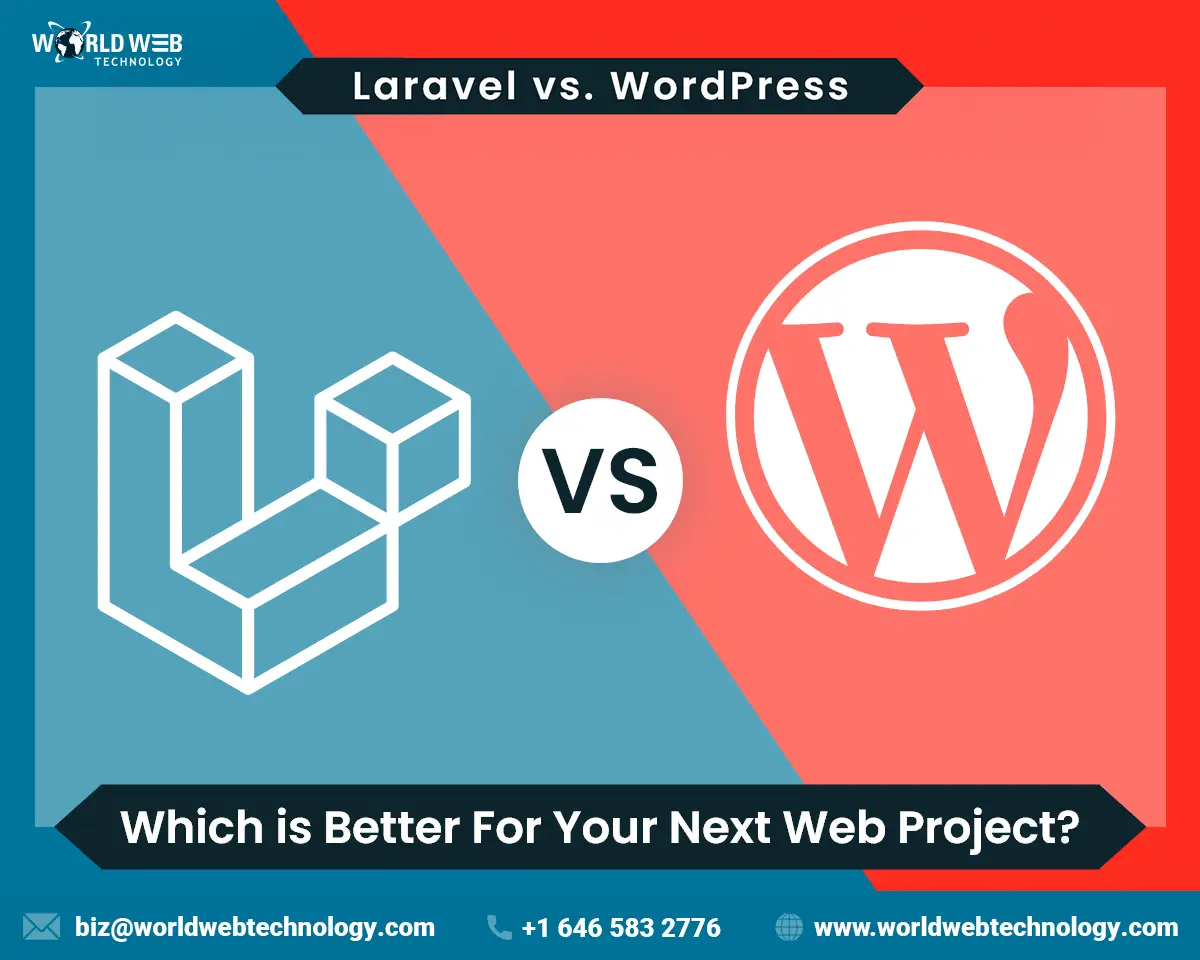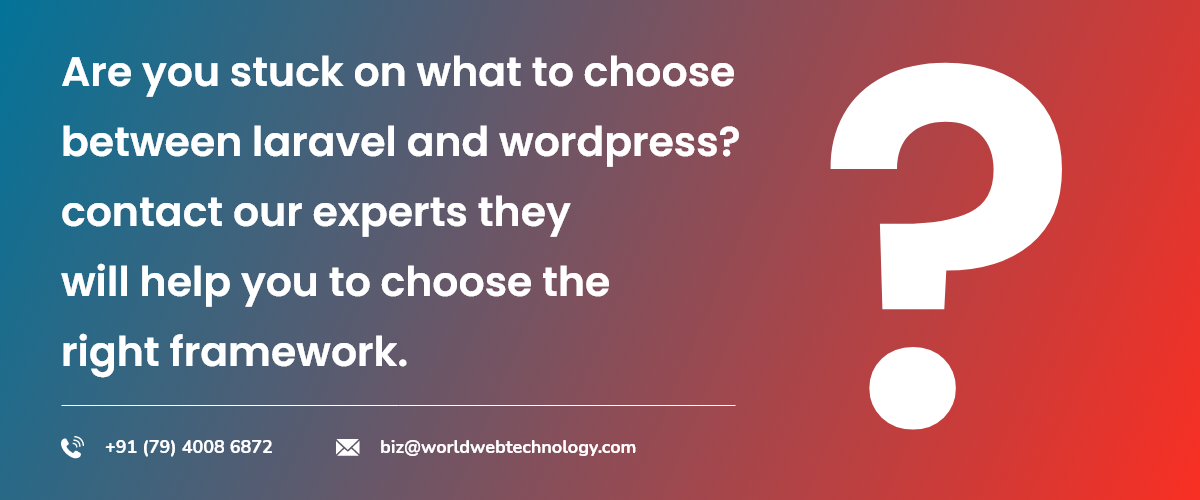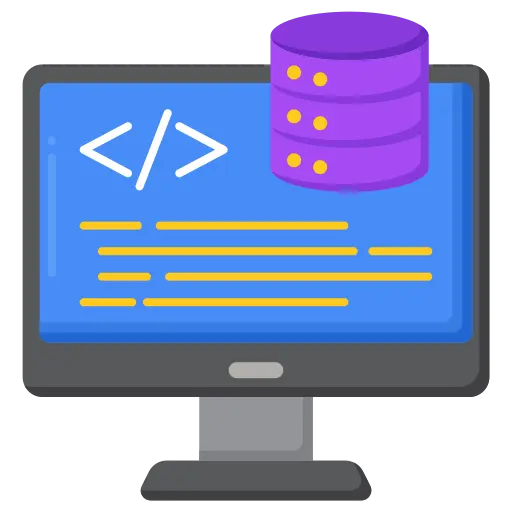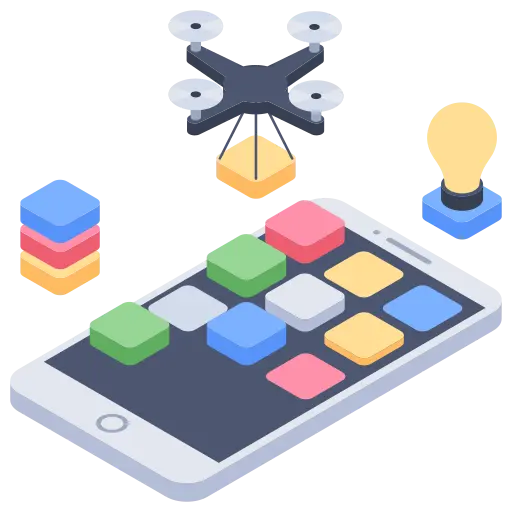Are you looking to build a website but feeling stuck while selecting the proper framework between Laravel vs WordPress? Deciding the right framework is always a hefty task to perform, but here we have come up with a complete and informational guide to assist you in resolving the dilemma.
Did you know?
- WordPress acquires around 60.8% of the total CMS market share.
- Around 14.7% of the world’s top websites get developed using WordPress.
- Laravel powered more than 1.1 million websites across the world by 2019, and the number is constantly increasing.
Laravel and WordPress are both efficacious frameworks for web development, but they can differ depending on the project’s diverseness. You may also consider why you should choose from these two web development frameworks over plenty of others. In this article, we’re going to provide you with a complete guide about Laravel vs WordPress to assist you in choosing the proper framework for your PHP web development. Let’s dig deeper!
What Is Laravel?
Laravel is an open-source PHP web application framework developed by Taylor Otwell. Initially released in 2011, the framework is designed for web application development that follows MVC (Model-View-Controller) architecture. The framework has a broad community supporting and enabling it to be more advanced and flexible.
Laravel has in-built features for localization, authentication, sessions, views, routing, and so on. Some default packages offered by Laravel are Cashier, Breeze, Envoy passport, and so on, which you can utilize for your web app development.
Laravel attempts to remove web development’s obstacles by easing the general tasks used in most development projects. These can be routing, sessions, authentication, and so on.
What Is WordPress?
Written in PHP, WordPress is an open-source CMS (content management system) used for building websites. Initially released in 2003, the platform powers more than 43.3% of all websites on the internet. WordPress is one of the popular, influential, and most used platforms for blogging, portfolio websites, eCommerce websites, business websites, and so on. The platform powers both the backend as well as the frontend of the WordPress website.
WordPress vs Laravel: Similarities
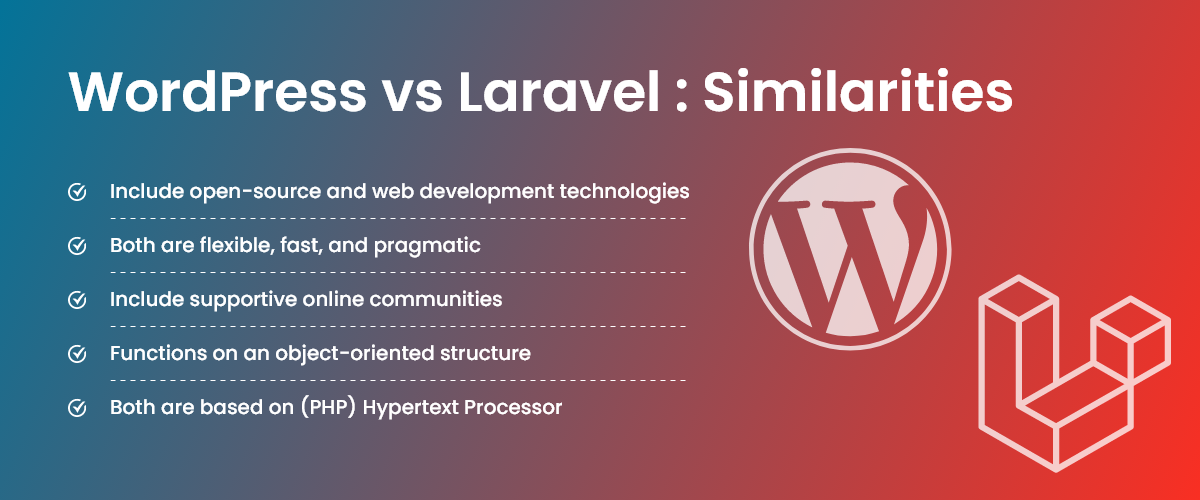
When it comes to the similarity between WordPress vs Laravel, both of the platforms are similar up to a large extent. Both of these two help you develop highly functional websites with a great user experience as well as easy-to-manage admin panels. Moreover, WordPress and Laravel are similar in these comparisons
- Include open-source and web development technologies
- Both are flexible, fast, and pragmatic
- Include supportive online communities
- Functions on an object-oriented structure
- Both are based on (PHP) Hypertext Processor
You can customize everything in both WordPress and Laravel. WordPress Functions on a theme-based structure, while Laravel comes with customizable packages, features, and reusable sets of PHP libraries.
Difference between Laravel And WordPress
As mentioned above, with powering more than 43% of websites worldwide, WordPress is one of the most popular solutions for building sites. Laravel, on the other hand, is also growing in popularity— as a large number of websites are built using this framework. Besides the fact that WordPress is a content management system (CMS) based on PHP, and the Laravel is a PHP Framework. The significant difference between Laravel And WordPress is as follows:
- WordPress relies on plugins for most of the functionalities. On the other hand, Laaravel has built-in features for authorization, inversion, control, validation, and so on.
- Using too many plugins can slow down the speed of WordPress websites, while the Laravel pages run seamlessly because of their automated and easily manageable tasks.
- WordPress requires less experience in development compared to Laravel
- The learning curve for WordPress is much more convenient than for Laravel
- Writing and migrating database queries is simple with Laravel compared to WordPress
- The security of WordPress websites relies on maintenance and updates of third-party plugins, unlike the security and stability of Laravel pages have the benefits of protection against cross-site scripting (XSS), authentication, lessening cross-site request forgery, and so on.
Besides all these factors, WordPress is considered more efficient for frequent website content updates. At the same time, Laravel is a better solution for custom web design that manages data and large-scale systems.
WordPress Vs Laravel: Head-to-Head Comparison
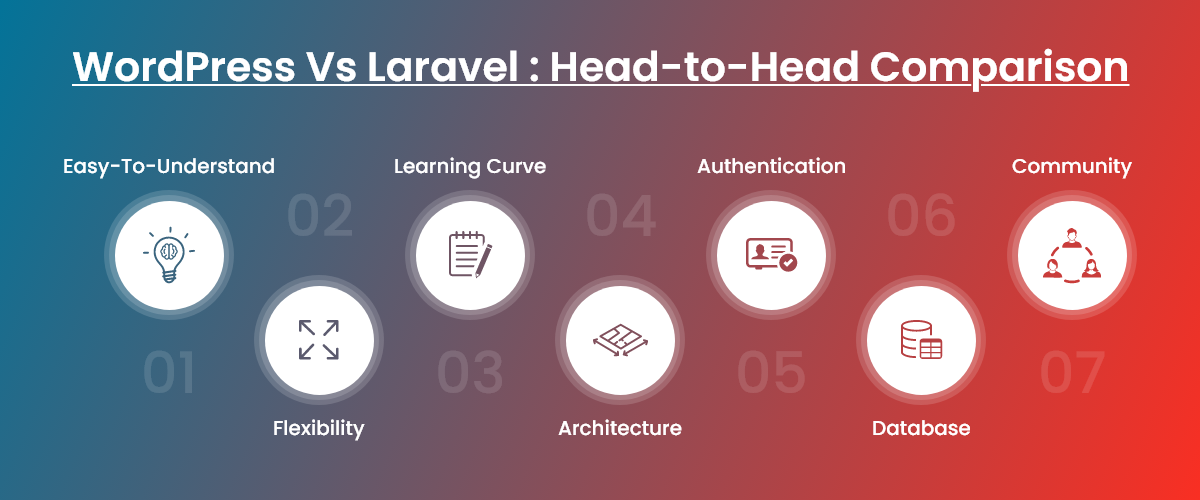
Easy-To-Understand
WordPress is more convenient to understand in comparison to Laravel. You start building websites by selecting the website’s theme in WordPress, but in the case of Laravel, you have to understand the code.
Learning Curve
In terms of the learning curve, Laravel is more complex. Laravel comes with a great learning curve, meaning the learning increases with increasing experience. In contrast, WordPress has less of it, and anyone simply writes and publishes content without any expense.
Authentication
Laravel has numerous features such as inversion of control, authorization, authentication, and so on. In addition, the authentication is improving with every release, while available plugins maintain WordPress authentication.
Community
WordPress wins the race in terms of community. It has a broader community compared to the community of Laravel. Having said that, the extensive community guides and supports the development team whenever they get stuck in any obstacle.
Flexibility
Laravel is less flexible than WordPress. It’s challenging to edit and update content in Laravel. Contrary to Laravel, editing and updating content with WordPress is very convenient.
Architecture
Laravel is based on Model-view-controller (MVC) architecture. On the other hand, WordPress has a plugin architecture.
Database
One can design or create a database in Laravel in one’s own way; unlike in WordPress, there’s no database required- as it contains static data.
Laravel vs WordPress: Performance
When it comes to comparing Laravel and WordPress in terms of performance, the former wins the race. Laravel is a framework, hence, quick and fast, and this makes it a better framework. Furthermore, the framework uses Eloquent, which makes writing database queries easy. Considering these facts, the Laravel is better in terms of performance.
WordPress is slow in performance just because it uses plugins. The most crucial point to consider here is that if you use strongly-coded plugins, WordPress also results in faster and quick performance. In WordPress, the speed and performance mainly depend on plugins that are used in the framework. The performance loads are less for small applications or blogs in WordPress. If the web application built using WordPress has more users, it becomes difficult to maintain the load, and the web app’s performance gets slower.
When To Use WordPress?
However, WordPress websites are based-on themes, but that never means you can’t create a new theme from scratch or customize an existing one to meet your requirements. If you want to start WordPress Web Development from scratch, you’d better go through the WordPress Codex- as it’s the crucial WordPress documentation resource. To use WordPress CMS, you require—
- Creating an online portfolio integrated with social networks.
- Building an SEO-friendly business website.
- Creating a simple webshop or a mid-sized eCommerce website.
- Creating a news portal, blog, or platform with heavily-loaded written content.
- To build a presentational website for personal and professional use.
If you’re developing an eCommerce website using WordPress, consider choosing Woocommerce. It’s an entirely customizable WordPress platform designed for eCommerce solutions. For those who want to build a well-performing, responsive, optimized website faster, WordPress is the right choice to go with.
When To Use Laravel?
Laravel is the best choice when you encounter complex requirements and have to develop custom web apps supported with loads of documentation. The primary objective of creating Laravel is to assist developers in dealing with complicated tasks quickly and conveniently. This is the very reason that the framework focuses more on flexible as well as state-forward syntax coding. Go with Laravel if you want to develop
- Dynamic websites with flexible backend systems.
- Large eCommerce websites with more than 10,000 products.
- Web applications with complexities.
- Platforms based on membership with an ability to process plenty of information.
The best advantageous feature of Laravel is its incorporated unit-testing feature that enables numerous simultaneous tastes and offers additional stability to web applications. Moreover, the pragmatic MVC pattern makes Laravel an efficacious web development tool.
Before you start developing your website using Laravel, read the documentation on Laravel’s website to garner more information and documents you require for your project.
Can Laravel-WordPress Hybrid be Possible?
Without a shadow of a doubt! Laravel and WordPress can be integrated and used together. However, for that to be possible, you must manage the frontend administration panel through Laravel and the backend through WordPress.
The best and most popular way to utilize such as hybrid is by a collection of PHP classes called Corcel. The Corcel is an open-source collection developed on the Eloquent technique from Laravel with an intent to assist developers in getting data directly from WordPress Database.
The hybrid use of Laravel and WordPress is beneficial for developers willing to use WordPress CMS while Managing complex tasks using Laravel.
Final Thoughts
Having gone through all facets of both WordPress and Laravel, we have found several pros and cons of these two. But, of course, deciding which is better depends on the project you’re going to develop.
WordPress is better for blogs, web presentations, news portals, and small to medium-sized online stores. On the other hand, Laravel is perfect for complex web applications, large eCommerce websites, complicated backend systems, and so on.
To know which is best suited for your project, measure the project in hand, gauge the Pros and Cons of WordPress and Laravel and go with the one that suits you the most.
Most Popular Categories
Discover top categories on our blog, featuring WordPress, PHP, eCommerce, and Shopify insights and tutorials.
Featured Insights
Immerse yourself in our passion for sharing the latest industry news, cutting-edge technologies, and insightful articles. Explore the depths of knowledge with us.

November 5, 2025
10 Proven Strategies to Increase Customer Lifetime Value with WordPress
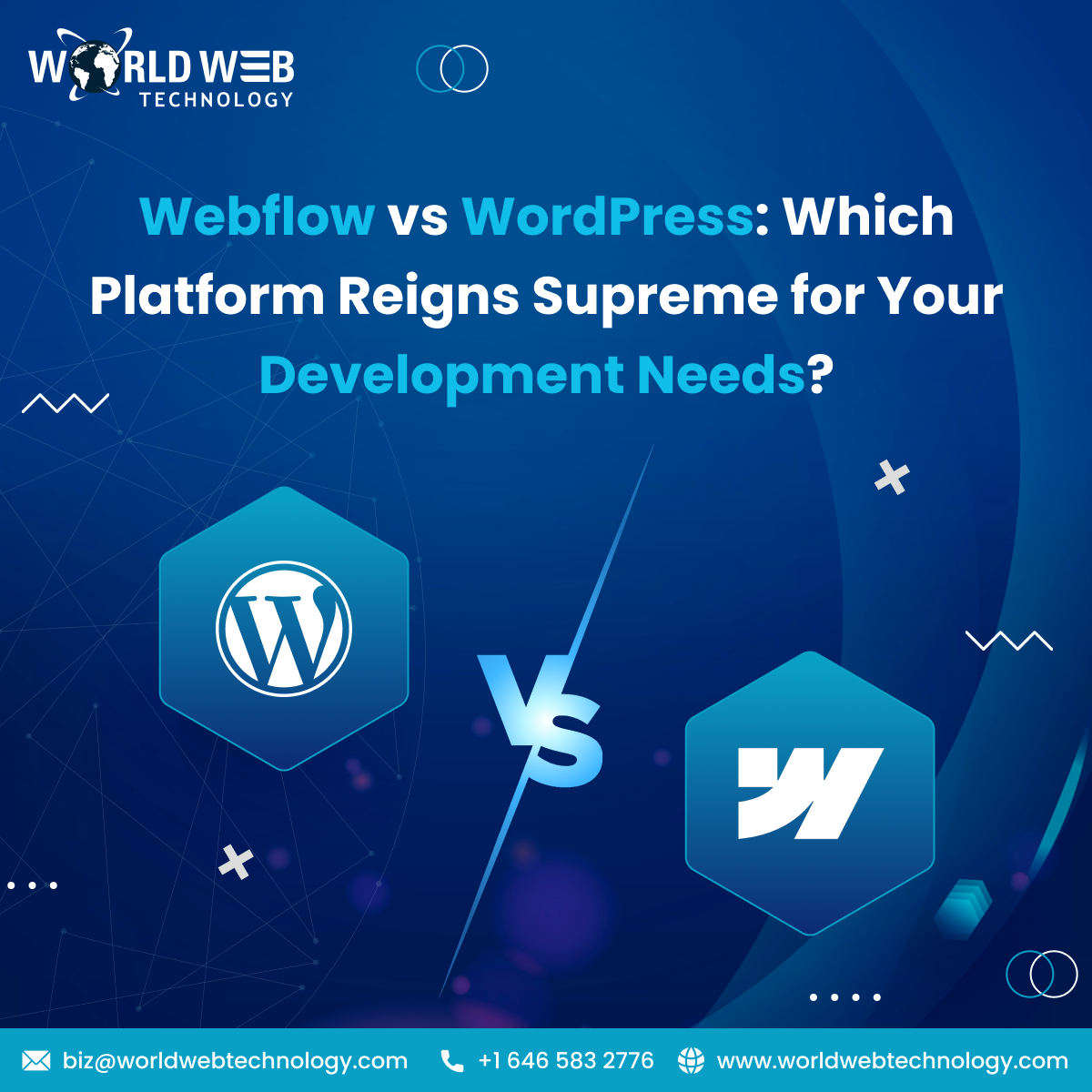
August 19, 2025



